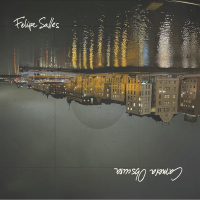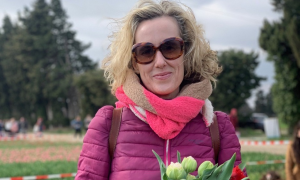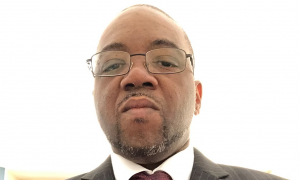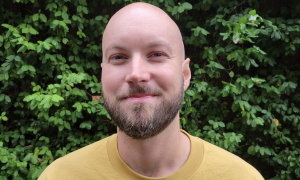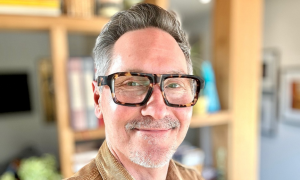Home » Jazz Articles » Chats with Cats » The Educator: Rich Thompson
The Educator: Rich Thompson

Courtesy Nadine Sherman
I have a mission statement for all my students. I say, 'Our job is to listen to the recordings and figure out how our instrument fits in with the music we're playing.' That's it.
—Rich Thompson

Rich Thompson
drumsAbout Rich Thompson
Drummer Rich Thompson has been in demand as a top call drummer in Rochester for the past 25 years. Besides serving as the drum set instructor at the Eastman School of Music since the fall of 1996, Rich has toured, performed, and recorded with the "who's who" of jazz greats including pianist
James Williams
piano1951 - 2004

Art Blakey
drums1919 - 1990
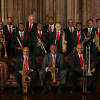
Count Basie Orchestra
band / ensemble / orchestra
Tito Puente
drums1923 - 2000

Frank Foster
saxophone1928 - 2011

Byron Stripling
trumpetb.1961

Rich Perry
saxophone, tenor
Bill Dobbins
piano
Harold Danko
pianob.1947
Marion McPartland
piano
Clay Jenkins
trumpetb.1964
Jeff Campbell
bassb.1963

Gene Bertoncini
guitarb.1937

Carl Fontana
trombone1928 - 2003
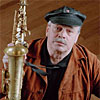
Phil Woods
saxophone, alto1931 - 2015

Joe Pass
guitar1929 - 1994
Rich has been touring this country and abroad with the Byron Stripling Quartet for the past thirteen years. His CD Trio Generations was released in May of 2012 on Origin Records. It was included on the long list for two Grammys. His CD entitled Less is More was recorded with trumpet sensation

Terell Stafford
trumpetb.1966

Gary Versace
piano
Charles Pillow
saxophoneRich performs regularly with numerous symphonies in the U.S. and Canada, on the world renowned "Jazz Cruise" and in jazz clubs throughout the U.S. and Europe with the Byron Stripling quartet. His clinics and performances have taken him as far as France, Thailand, Japan, Switzerland and Newfoundland. Rich has written four drum set books published by Kendor Music USA and Advance/Schott Music-Germany.
All About Jazz: Since you've been playing have you always wanted to teach?
Rich Thompson: Well, I've always wanted to give back for all the mentors and great teachers that I have had. I didn't really start out to do that. I started out to go on the road. I came to Eastman in the early '80s because I knew that Eastman was one of the schools that picked up people for the road gigs like North Texas did. I was studying with
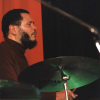
Keith Copeland
drums
Billy Taylor
piano1921 - 2010
So, I went there with the explicit purpose of snagging a road gig when I got out. I graduated from Eastman after doing my Masters in 1984 and I was just playing a couple gigs in town. One of them was with a really great pianist named Barry Kiener who had gotten off the road with the

Buddy Rich
drums1917 - 1987
Glenn Miller Orchestra
band / ensemble / orchestra
Byron Stripling
trumpetb.1961
So, I started teaching and only taught for a year before I moved to New York City because I got a study grant with Keith to study the music of

George Russell
composer / conductor1923 - 2009

Count Basie Orchestra
band / ensemble / orchestraSo I went out on the road with the Basie band and after about five or six months Eastman called me and said, "hey, would you consider teaching at Eastman when you get off the road with the Basie band?" I said, "Sure, I'll do that." The Basie band found out that I got a call from Eastman and they let me go.
AAJ: Was it disappointing to be let go?
RT: Yea, it was disappointing. They hired another drummer who had subbed for me while I was out of the band because I was starting to play a lot of gigs with this Pops Conductor, Jeff Tyzik. I just started teaching and playing symphony gigs with Tyzik. Man, it wasn't two months before the Basie band started calling me for gigs again. They didn't like the drummer that they hired. They found out that night after night he couldn't really read the endings of the charts.
So I went back and started playing some gigs with them. I played New Year's Eve with them. I played the Clinton second inaugural with them. They wanted to hire me to come back out on the road but I didn't really trust the politics of the band. There are political things that go on in big bands when sixteen to eighteen guys go out on the road. I said, "I'll come out and sub anytime you need me but I have too many plates spinning to stay out."
I was teaching at Eastman, I was teaching at this high school, I was travelling with this conductor Jeff Tyzik, and I was going out with the Basie band at least once a month subbing for

Butch Miles
drumsb.1944
I've been teaching at Eastman for twenty six years but I still go out all the time. I have been playing in the Byron Stripling Quartet since 2008 touring this country, and in Switzerland, and playing the Jazz Cruise five times before they shut it down for Covid. All while teaching at Eastman.
AAJ: It's great that you have that flexibility.
RT: That's the whole thing. I have the flexibility to teach and to go out and play. My students understand it and they welcome it.
AAJ: You've been teaching quite a long time then. What are the differences from when you started?
RT: Well, the difference is that technology has changed everything. I'm teaching students now who have never known life without a cell phone. I'm teaching students now that didn't really know what a CD was. I had a couple extra CD players in my basement that I gave to some of my drummers. They were thrilled to have them because they said, "now we can play the CDs that you and other people have given us and can hear what they sound like." They're used to dialing it up on Spotify, Apple Music, and YouTube.
The differences are good and bad. In the early days of teaching, in the 90s, students would show me their CD wallets. I'd look through it and there would be two hundred CDs in it and they would be great records. They would also know who was on those records. Nowadays, students don't know who is on the records most of the time unless you ask them to go research the personnel. Then, they go to AllMusic, or Wikipedia or one of these other places where they give all the credits to try to research what's going on. But it's not first in their mind like it was when I was growing up. It's not tactile like it was when you were holding a big vinyl record or a CD and you were reading the liner notes while the thing was playing.
That's on the negative side but, on the positive side, as you're teaching them you can say, "Hey, we're going to study what

Philly Joe Jones
drums1923 - 1985
When I was in school, I had to get in my car, drive to a record store, flip through all the records and, nine times out of ten they would be out of that record or it was out of print. So you'd go to your local library and try to find it there. It was a lot of investigative work. With my students, their investigative work is two thumbs and a phone.
AAJ: Do you think that the immediacy of technology such as YouTube. or the iRealBook has made students more prepared when they get there?
RT: I think that they have the opportunity to be more prepared but they're still students. You still have students who will take the time to be prepared and you have the students that'll be looking and fumbling for it at the last minute. I always tell my students that you use technology to enhance musicianship. I have a mission statement for all my students too. I say, "Our job is to listen to the recordings and figure out how our instrument fits in with the music we're playing." That's it.
When I tell them that they shake their heads. I tell them, "When you start to sound like the record you know you're getting somewhere." That was our mentors growing up. I do think that I am jealous that they are able to go to YouTube and find a live performance of something that I might have gotten to hear when I was their age but it's just so immediate now.
AAJ: Right, there are so many more resources available now.
RT: There are. Eastman is one of those lucky schools where, because of the audition process, the cost of the school, and the seriousness of the students at the school, most of the students there are really playing their tails off in a very short order. They were talented coming in, they know it's not inexpensive, and they're really wanting to get it together.
AAJ: So the stakes are pretty high?
RT: Yea, the stakes are kind of high. I remember it was a pressure cooker when I did my Masters there.
AAJ: What do you think makes a great teacher?
RT: I think knowing how to say the same thing twenty different ways because you're going to have learners who perceive things in different manners. You have visual learners, you have aural learners, and you have oral learners. Being able to actually play your instrument yourself and being able to sit down and play something to inspire them is important. Being able to have the resources, like we've been talking about, of having this music on my phone and saying, "Let me play this for you."
I don't think an art teacher would ever ask a student to paint in the style of somebody without showing them paintings by that person. I think that my success with students has been having them listen to what we're trying to work on by the great masters and being able to play some of that myself and showing them that it's doable. Then, encouraging them to play as much as possible outside of class. In the '30s, '40s, and '50s, people were playing multiple gigs a day. They had radio gigs, television gigs, club gigs, and they had after-hours sessions. We don't have that anymore so that's been the bad part of technology. I encourage them just to be playing with their peers as much as possible. And at Eastman we, the faculty, play with our students.
AAJ: That kind of leads me to my next question which is what makes a great student?
RT: I think students that are self-motivated and internally generated in trying to improve makes for a great student because then we're just guiding them. We're not pulling teeth to do what all musicians have to do to become good. I, as a teacher, am trying to find a way to turn on that self-motivation process. If that student comes to me and has that switch already flipped to the on position then it's limitless what we can do in trying to study this music. But, if you have to take the student and constantly be a cheerleader for learning and progressing then that's hard labor.
AAJ: So my impression and, and please correct me if I'm wrong, is that Eastman is mostly a classical school. Is jazz treated as if it's secondary?
RT: I don't think so anymore. In the 60s, jazz was sort of frowned upon still at Eastman. But,

Chuck Mangione
flugelhorn1940 - 2025

Bill Dobbins
pianoWhen I went to Eastman in '82 -'84 it was a graduate jazz program. It didn't have an undergraduate degree as many colleges did except for North Texas and maybe a couple others. Throughout the '80s, the graduate program continued to grow and, by the '90s, there were already proposals for the undergraduate program. When Bill Dobbins went to Germany to direct the Cologne band they hired an alumni of Eastman named

Fred Sturm
composer / conductor1951 - 2014
Jeff Campbell
bassb.1963

Bob Sneider
guitarWe're currently celebrating Eastman's one hundred year centennial but we've had a full undergraduate and graduate jazz program for just under thirty years.
AAJ: How do you feel about so many students learning jazz at universities when you know the reality is there may not be opportunities for everybody when they all get out?
RT: I know some of my own colleagues who took computer jobs and things like that but are still playing very strong and they're still playing gigs. They're playing gigs with symphonies and pops orchestras, still composing music, still playing big band gigs, and still playing small group gigs. I think about that all the time. I've always thought that we're not only creating great musicians, we're also creating an audience and appreciation for this music. I had a drum student who got his undergraduate degree in jazz performance and is a doctor now. He plays in a doctors' band. These are smart people. You know what I mean?
You don't get to this level and then say, "Ehh. I'm going to become something else. That was then and is in the past." I don't think you can play at that level, put that much of your heart and passion and soul into something, and just forget that. I do think that you're right. I mean how many spots are there for all these musicians that we're cranking out? Eastman is a small token of that because we have sixty graduate and undergraduate jazz students.
Now, if you come to Eastman as a performance major, you're going to play in a combo every week and you're going to be assigned to a big band. My studio is limited to eight drummers because we have eight small groups and eight big bands. It's not like other schools where you have one hundred and ten drummers and only ten big bands. Where are a lot of those drummers playing? Our program is really high on content and exclusive. It's not that it's elitist, but it's exclusive in the fact that if you come here you're going to be performing a lot every week in a large group and a small group. And, we have venues in town where the students play all the time. So, they're playing outside of class a lot.
AAJ: How have things changed since Covid? Obviously, everything was different during lockdown but are you still feeling the effects of it?
RT: Well, we went through a whole recruiting slump because the whole country went on pause. I say that yet our numbers are up for this year. But there was a year in there where Covid changed things because we couldn't have live auditions. Students were auditioning at ten different universities instead of three or four. So, their choices were purely financial.
This year, we're back to live audiences. I just did a concert last night and probably had the place two thirds full. We livestream everything so there are still people watching it on the livestream but I looked out and I was amazed at how many people were there. They were ready to go. It's so great for the students because they get to hear all that applause for their solos. They got a standing ovation after the concert. They didn't get to experience that for a year and a half.
Except for the first Spring of Covid when the whole country shut down and everybody went home, by the Fall of 2020 we were open for business with masks. And this year there was a vaccine mandate and everyone is vaccinated.
AAJ: So would you say it's business as usual now?
RT: I would say if it's not business as usual it's probably ninety percent business as usual and I'm so thankful that we can have live auditions again. It's one of these places that once you've been here you'll get it. George Eastman of Kodak fame built this school back in the day because he believed in the arts.
AAJ: I've asked you questions about the past and how things have changed. Looking ahead, do you feel positive about the direction that jazz education is going and how students are being prepared?
RT: Some people talk about some programs as being a jazz country club. I don't feel like Eastman is a jazz country club. I don't feel like it's a jazz holding tank. Like I said before, I think the content is really high and that's due to the teachers in the Jazz and Classical Departments. As a school, on the whole, there's a lot of expectation from our students and they don't all make it. Some of them decide, "hey, I can't take the rigor." But I think that's a good thing. As you and I both know, once you get out in the real world, if you can't take the rigor then you're doing something else. Don't take this the wrong way. We really like our students. We really try to be nurturing and give them as much guidance as we can.
I think that we always struggle with the fact that jazz is two or three percent of total sales in our country. But, I think I liken it more towards America's classical music in that there's always room for good players. There's always room for good music in the form of compositions and arrangements. So, I'm always upbeat and positive about this music surviving because something about it goes deeper than what one can write in a book or talk about. You and I both know that when you're on the bandstand and if you've ever felt that magic, or you've ever been a listener in the audience and you felt that magic coming off the bandstand, that's what keeps the music alive.
Tags
Comments
PREVIOUS / NEXT
Support All About Jazz
 All About Jazz has been a pillar of jazz since 1995, championing it as an art form and, more importantly, supporting the musicians who make it. Our enduring commitment has made "AAJ" one of the most culturally important websites of its kind, read by hundreds of thousands of fans, musicians and industry figures every month.
All About Jazz has been a pillar of jazz since 1995, championing it as an art form and, more importantly, supporting the musicians who make it. Our enduring commitment has made "AAJ" one of the most culturally important websites of its kind, read by hundreds of thousands of fans, musicians and industry figures every month.
Go Ad Free!
To maintain our platform while developing new means to foster jazz discovery and connectivity, we need your help. You can become a sustaining member for as little as $20 and in return, we'll immediately hide those pesky ads plus provide access to future articles for a full year. This winning combination vastly improves your AAJ experience and allow us to vigorously build on the pioneering work we first started in 1995. So enjoy an ad-free AAJ experience and help us remain a positive beacon for jazz by making a donation today.
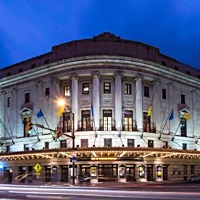
Rochester
Concert Guide | Venue Guide | Local Businesses
| More...


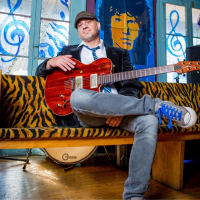





 Buy Now
Buy Now



